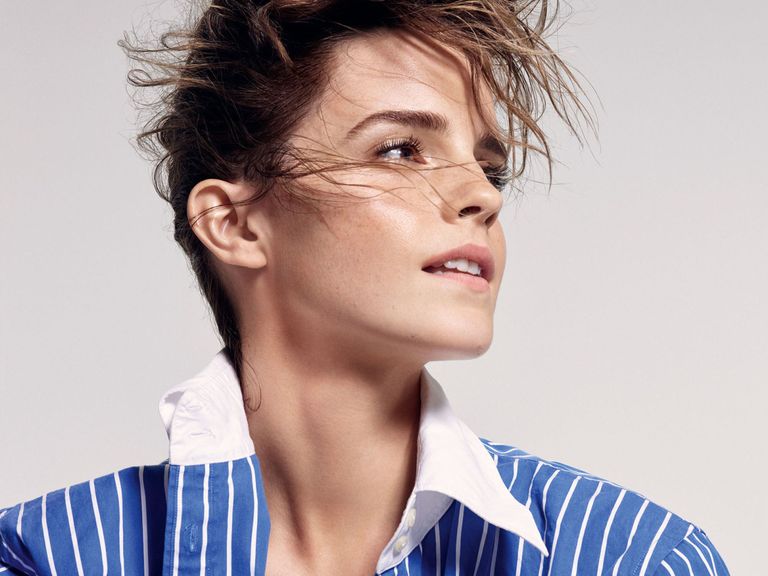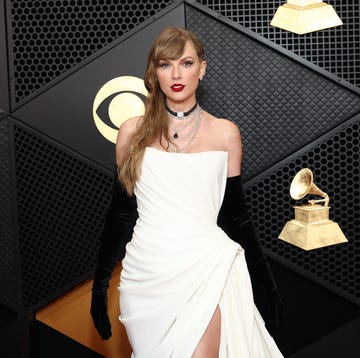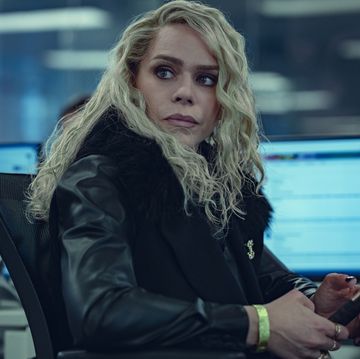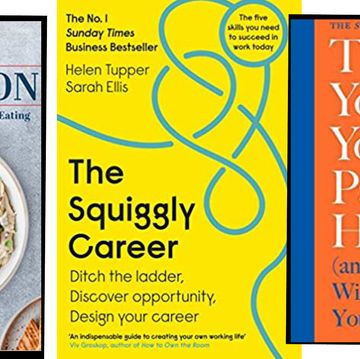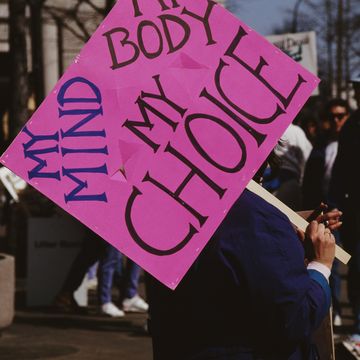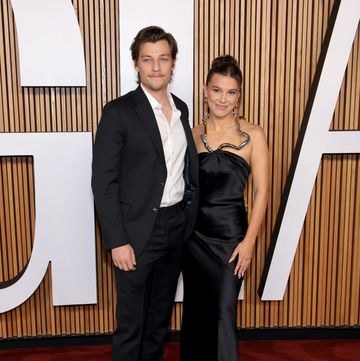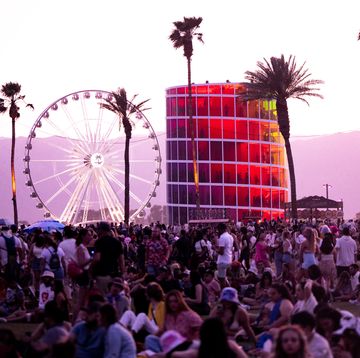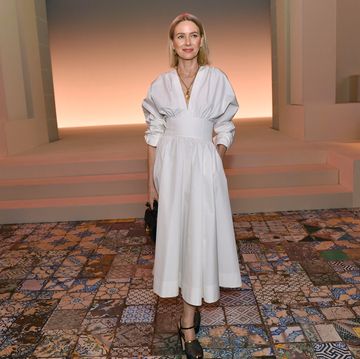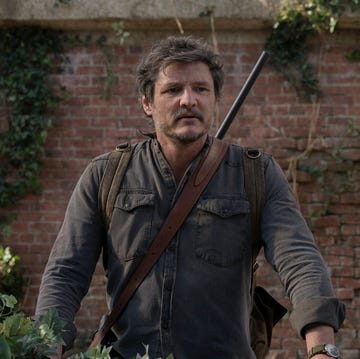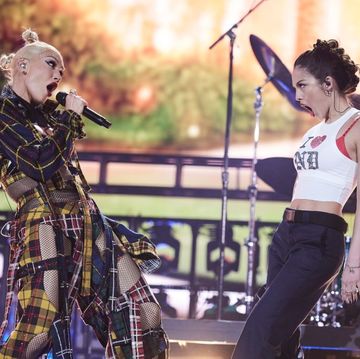During Emma and Eve's must-read conversation - that will run for the next 4 days right here on ELLEUK.COM - Emma gets to the heart The Vagina Monologues, discussing its continuing relevance in 2017.
She also hears Eve's thoughts on Trump's America, the future of the women's resistance and the devastating and inspiring experiences behind her One Billion Rising campaign to end violence against women.
PART 1. 'A wild vagina journey.'
In this first part, Emma and Eve talk about the difficulties of bringing The Vagina Monologues to publication and the activism it helped create.
Emma Watson: Hello lovely Eve, how are you?
Eve Ensler: You know, this is One Billion Rising season, so it's been crazy.
Emma Watson: Ok, so I've written out my questions for you because I'm nerdy like that.
Eve Ensler: I do love your book club, I think it's amazing.
Emma Watson: It's my favourite project, I just love it, it's so cool. Here's where I'll start: I went on holiday last week and I read Insecure At Last, which I hadn't read before, which I just loved. Hats off to you, it's so brave to make your personal political. Last year I also read In the Body Of The World, and then we've obviously been doing The Vagina Monologues. Do you have a favourite of your pieces of work?
Eve Ensler: No. They're all so different, and it depends – people always used to ask me about The Vagina Monologues, "what's your favourite monologue?" and it's such a cruel question, like choosing one woman over another woman. I think sometimes you have days when you're more drawn towards one book or one monologue than you are to others.
Emma Watson: Absolutely - it's speaking to you at a different time. The book had a bumpy road to publication, with one publisher deciding they didn't want to publish it after all. Can you tell me what that experience was like?
Eve Ensler: Oh yeah, it was wild. First of all, no one wanted to touch it. Then we finally we got a publisher that was very gung-ho and I was really excited. But as we were getting closer to publication, they got cold feet. The publisher called me up and he said: "We really want you to change the title." And I knew they didn't want to publish the book. I remember going into this room and looking at this guy and saying: "This is a crossroads, and your decision not to publish this is about your character, your integrity. YOU HAVE TO LIVE WITH THAT, NOT ME." So luckily, I went and sold the book somewhere else. It was incredible to have a publisher pull out the rug from underneath you at the moment of publication. It was pretty horrific.
Emma Watson: That's the kind of the critical moment when you really want and need someone to believe in you and back you. How did you just believe in yourself, and the book, so much?
Eve Ensler: It was all about the women. The Vagina Monologues is a fictional piece, but it's based on real interviews with women. I was carrying their stories; I was carrying their hearts and very real experiences. So it wasn't about me.
Emma Watson: One hundred percent! Was it difficult to go on to write other plays and books when you were still involved in the phenomenon that The Vagina Monologues became?
Eve Ensler: In some ways it consumed my life. A really wise producer said to me: "This is your blessing and your curse. Because you're going to compare every play you write after this to it, and it will be disappointing." But honestly, I feel that to have had such a phenomenon in my life, which brought me and connected me to women all around the world, allowed us to be build and be part of these unbelievable movements - 'V Day' and 'One Billion Rising'. My gratitude is so immense for this wild vagina journey.
Emma Watson: Awesome. 'V Day' has achieved so much, and done so many different things, is there but what would you say you are most proud of, that has come out of 'V Day?'
Eve Ensler: Well, where I've been going recently, there are young women who I call 'Vagina Insurgents'. Women who have done The Vagina Monologues (cut) who are just showing up everywhere, right?
Emma Watson: Yeah!
Eve Ensler: I was doing an interview recently with a woman journalist who had been in The Vagina Monologues. I was at a school and a woman who was a teacher, had been in The Vagina Monologues. They are everywhere. It is so moving to see twenty years later, so many women coming up to me saying that The Vagina Monologues was the moment in their lives when they came into their activism, when they found their voice. And to think there's a world of 'Vagina Insurgents' out there who are now activists, social workers, teachers, lawyers, running for political office-- that is thrilling.
I think the other thing I am most proud of is that at the very beginning, we made a decision that every production would have a woman of colour in the cast. It was actually in my contract and the producer David Stone totally supported this idea. Then Lisa Gay Hamilton and Rosie Perez did an all women of colour production in Harlem and I think the combination really allowed women of colour to not only be front and centre in performing the piece, but directing, producing and bringing it to their communities. Ten years ago I spent time with transgender women interviewing them and writing a new piece based on those interviews which is now part of the show. They did the first all Transwomen production of The Vagina Monologues and it was very powerful and at the time, ground breaking.
I feel proud of the diversity. I feel proud of every woman who's put the play on for the first time in their community and taken a huge risk.
Emma Watson: I love that idea of having an activist spine and the strengthening of it, that's brilliant. Do you think that the word vagina is still hard for people to say in 2017? Over the years, have you noticed moments in time when you feel like people are getting more comfortable saying it, and then we pull back again, and we move forward?
Eve Ensler: Well, when I started The Vagina Monologues, no one could say the word vagina. They did a ten-minute CNN piece on the play and they never mentioned the word.
Emma Watson: Hang on - it was essentially considered a swear word?
Eve Ensler: Yes, you could say penis on television but you couldn't say vagina.
Emma Watson: Wow.
Eve Ensler: To see how much it's become part of the discourse now is pretty incredible. You can't turn on anything without somebody talking about vaginas. We have definitely made strides forward, but it seems to me it's always one step forward two steps back, because patriarchy is the most persistent, stubborn virus. We are still searching for political and spiritual antibodies to fight this massive infection. Then perhaps we will be able to wipe it out for good.
Now read Part 2 of Emma and Eve's conversation right here - the pair talk about the dangers of patriarchy, women's rights to choice, and Eve's harrowing trips to Bosnia and Croatia to meet survivors of wartime rape camps.
You can join Emma's book club, Our Shared Shelf, here: www.goodreads.com/oursharedshelf
